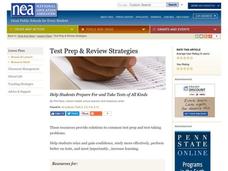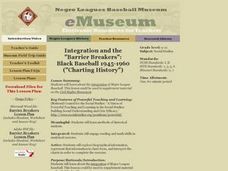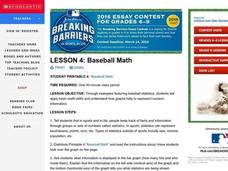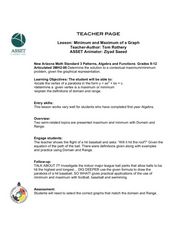Curated OER
Play Ball: A Major League Review Game
Apply the game of baseball to a fun review activity. Pupils earn a "base" for each subject question that they answer correctly. This activity can be modified and used for any subject area, including math, social studies, and language arts.
Curated OER
Play Ball: A Major League Review Game
For this review and test-taking practice lesson plan, the classroom is set up like a baseball field. The class is set up into 2 teams and has to answer questions that moves them along the bases like in baseball. The team that wins has...
Curated OER
Stadium Consultants
Young scholars conduct research to determine the operating costs and considerations for a Major League Baseball stadium. They act as consultants and formulate recommendations for ticket prices, player salaries, rainy day play and stadium...
Curated OER
Play Ball!
Students pretend as if they have been hired by the commissioner of Major League Baseball. Their task is to explain the mathematics of baseball so that more people enjoy the game.
Mathalicious
Out of Left Field
A baseball trajectory and a parabola seem to make the best pair in real-world quadratic applications. Here is a current baseball resource with questions, discussions, and explorations regarding a quadratic function and home run...
Curated OER
Integration and the "Barrier Breakers": Black Baseball 1945-1960
Students explore integration of Major League Baseball, identify important individual baseball players who played key roles in integration, and analyze historical information through charts, graphs, and statistics.
Curated OER
Math League Baseball: Five Week Project
Eighth graders analyze how to use statistics, change fractions to decimal, and graph their statistics. They draft players from Major League Baseball eams and chose on player for each position, including 3 oufielders and one designated...
Curated OER
Variance and Covariance: How much to do baseball players really make?
Is baseball really the road to riches? Here, statisticians look at salary data from baseball players and use variance to measure the spread of the data to more accurately answer that question. Note: The salary data provided is from 1994,...
Curated OER
Baseball Math
Students collect data on baseball plays. In this statistics lesson, students graph their data and make predictions based on their observation. They calculate what the probability is that a favorable outcome would happen.
Curated OER
Does More Wins Mean More Fans At The Ballpark?
Pupils, after getting information from the past baseball season off the Internet, calculate an attendance-to-win ratio for each of the 28 major league teams and then study the results to see if winning always leads to good attendance.
Curated OER
The Race of Baseball All-Stars
Collect and analyze data. Pupils graph their data and model with it to solve real life problems. They use logic and deductive reasoning to draw conclusions.
Virginia Department of Education
Organizing Topic: Data Analysis
Learners engage in six activities to lead them through the process of conducting a thorough analysis of data. Pupils work with calculating standard deviations and z-scores, finding the area under a normal curve, and sampling...
Curated OER
The Majors and the Minors
Students create ways to compare and contrast major league and minor league baseball players using statistical tables. Video segments spur a discussion on the differences between a major league player and a minor league player. Students...
Curated OER
Past and Present: Using baseball statistics to teach math
Learners use baseball cards to add up batting average and reinforce math skills. In this batting averages lesson plan, students use old baseball cards to practice different math skills and look at other baseball statistics.
Curated OER
Ag In The Outfield
Young scholars explore baseball. This is a cross-curricular plan that includes math, history, and agriculture. Pupils use their five senses to observe the materials a baseball is made from and identify the agricultural products used. In...
Curated OER
Fantasy Baseball Team
Students create a database and use its ability to store, sort, and present information about their fantasy baseball team. They gather information and use their knowledge of statistics to accomplish their team.
Curated OER
America's Pastime
Students relate Newton's Laws of Motion to the game of baseball. They compare and contrast the materials used in baseballs that could affect their performance. They also determine how friction can be increased or decreased in a ballpark.
Curated OER
Play Ball
Students calculate baseball statistics and ball field dimensions. In this Pythagorean Theorem, percentages and metric conversion lesson, students are given formulas to find earned run and batting averages for White Sox baseball players....
Curated OER
Minimum and Maximum of a Graph
Young scholars find the solutions of polynomials through graphing. In this algebra lesson, students identify the maximum and minimum of each polynomial function. They ind the vertex, domain and range of a parabola.




















